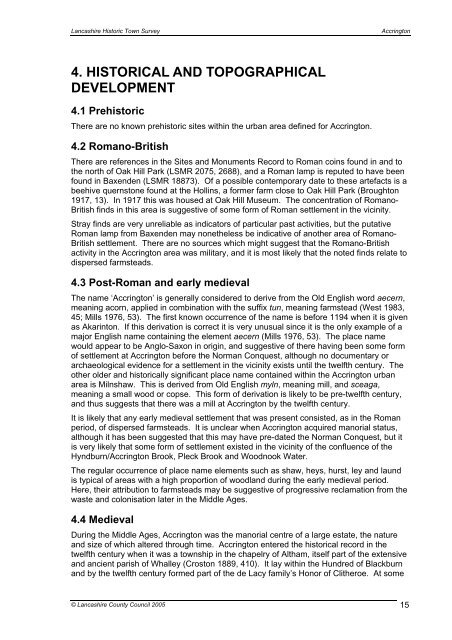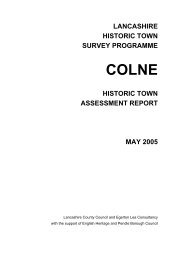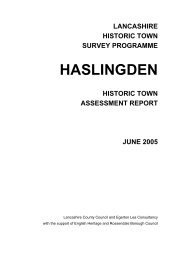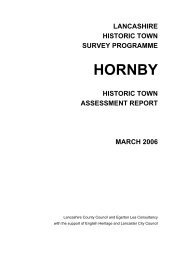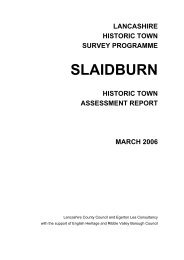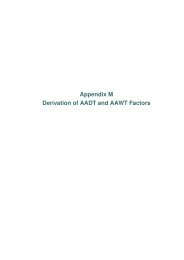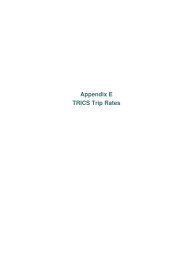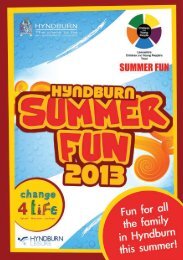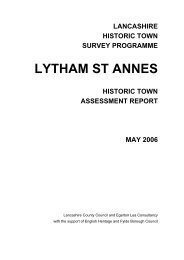ACCRINGTON - Lancashire County Council
ACCRINGTON - Lancashire County Council
ACCRINGTON - Lancashire County Council
You also want an ePaper? Increase the reach of your titles
YUMPU automatically turns print PDFs into web optimized ePapers that Google loves.
<strong>Lancashire</strong> Historic Town Survey<br />
Accrington<br />
4. HISTORICAL AND TOPOGRAPHICAL<br />
DEVELOPMENT<br />
4.1 Prehistoric<br />
There are no known prehistoric sites within the urban area defined for Accrington.<br />
4.2 Romano-British<br />
There are references in the Sites and Monuments Record to Roman coins found in and to<br />
the north of Oak Hill Park (LSMR 2075, 2688), and a Roman lamp is reputed to have been<br />
found in Baxenden (LSMR 18873). Of a possible contemporary date to these artefacts is a<br />
beehive quernstone found at the Hollins, a former farm close to Oak Hill Park (Broughton<br />
1917, 13). In 1917 this was housed at Oak Hill Museum. The concentration of Romano-<br />
British finds in this area is suggestive of some form of Roman settlement in the vicinity.<br />
Stray finds are very unreliable as indicators of particular past activities, but the putative<br />
Roman lamp from Baxenden may nonetheless be indicative of another area of Romano-<br />
British settlement. There are no sources which might suggest that the Romano-British<br />
activity in the Accrington area was military, and it is most likely that the noted finds relate to<br />
dispersed farmsteads.<br />
4.3 Post-Roman and early medieval<br />
The name ‘Accrington’ is generally considered to derive from the Old English word aecern,<br />
meaning acorn, applied in combination with the suffix tun, meaning farmstead (West 1983,<br />
45; Mills 1976, 53). The first known occurrence of the name is before 1194 when it is given<br />
as Akarinton. If this derivation is correct it is very unusual since it is the only example of a<br />
major English name containing the element aecern (Mills 1976, 53). The place name<br />
would appear to be Anglo-Saxon in origin, and suggestive of there having been some form<br />
of settlement at Accrington before the Norman Conquest, although no documentary or<br />
archaeological evidence for a settlement in the vicinity exists until the twelfth century. The<br />
other older and historically significant place name contained within the Accrington urban<br />
area is Milnshaw. This is derived from Old English myln, meaning mill, and sceaga,<br />
meaning a small wood or copse. This form of derivation is likely to be pre-twelfth century,<br />
and thus suggests that there was a mill at Accrington by the twelfth century.<br />
It is likely that any early medieval settlement that was present consisted, as in the Roman<br />
period, of dispersed farmsteads. It is unclear when Accrington acquired manorial status,<br />
although it has been suggested that this may have pre-dated the Norman Conquest, but it<br />
is very likely that some form of settlement existed in the vicinity of the confluence of the<br />
Hyndburn/Accrington Brook, Pleck Brook and Woodnook Water.<br />
The regular occurrence of place name elements such as shaw, heys, hurst, ley and laund<br />
is typical of areas with a high proportion of woodland during the early medieval period.<br />
Here, their attribution to farmsteads may be suggestive of progressive reclamation from the<br />
waste and colonisation later in the Middle Ages.<br />
4.4 Medieval<br />
During the Middle Ages, Accrington was the manorial centre of a large estate, the nature<br />
and size of which altered through time. Accrington entered the historical record in the<br />
twelfth century when it was a township in the chapelry of Altham, itself part of the extensive<br />
and ancient parish of Whalley (Croston 1889, 410). It lay within the Hundred of Blackburn<br />
and by the twelfth century formed part of the de Lacy family’s Honor of Clitheroe. At some<br />
© <strong>Lancashire</strong> <strong>County</strong> <strong>Council</strong> 2005 15


